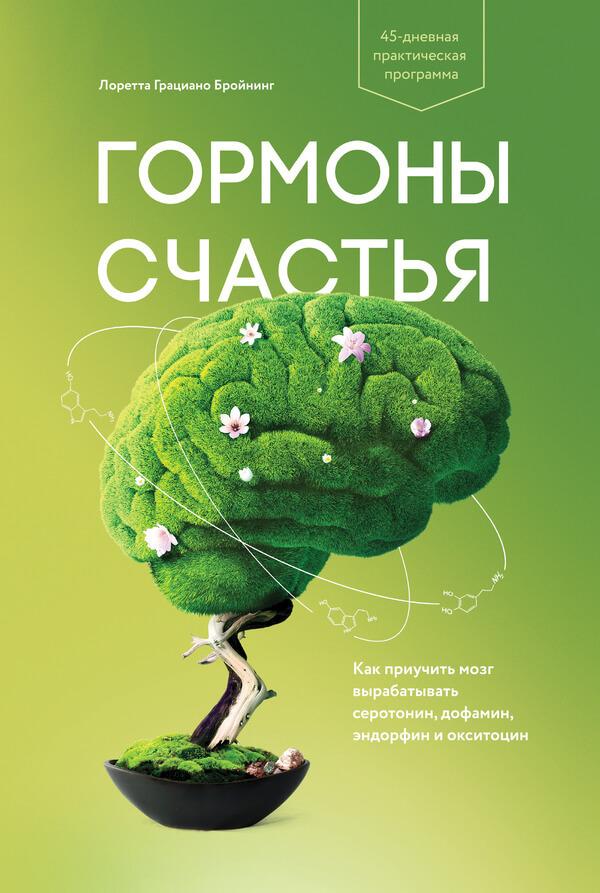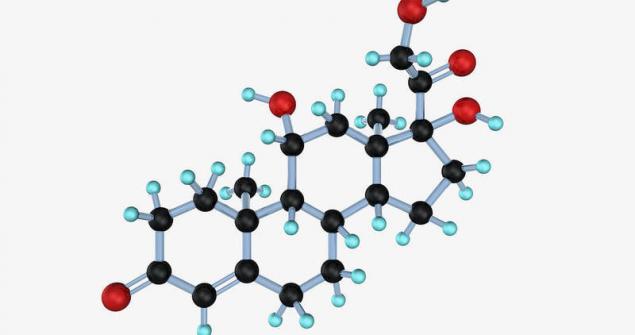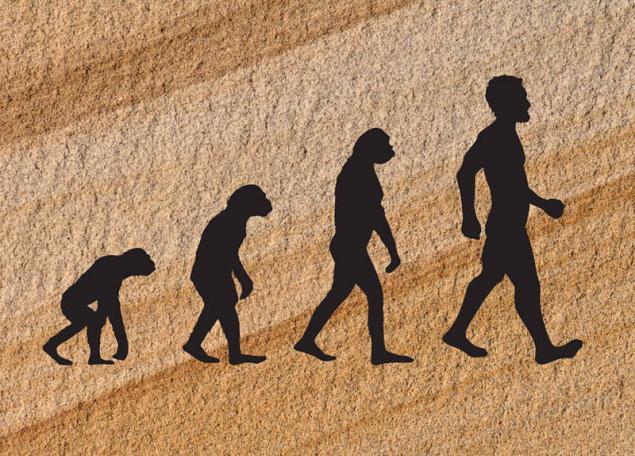Detector of danger: Cortisol — the hormone "alarm"
 Bashny.Net
Bashny.Net
The simplest failure or disappointment small brain sees as a potential threat to life.
To once experienced the pain did not recur, the body produces a special hormone — cortisol, which in varying quantities gives us the feeling of fear, anxiety or even stress.
The book by Loretta Graziano, Breuning "Hormones of happiness. How to teach the brain to produce serotonin, dopamine, endorphin and oxytocin".
Publish an excerpt about how our detector of dangers, and why the thought of extra pounds makes a person more unhappy than the story of the mortal illness of their ancestors.

"Stress hormones" — a natural alarm system
When you see a lizard basking in the sun, you can think: "Here it is, boundless happiness." But in fact, you can just see the lizard trying to escape from death. Cold-blooded reptiles can die from hypothermia if they are not often out in the sun. But basking under it, they may become the prey of a predator. Why reptiles many times a day do you move with the sun, threatening death, into the shade and back. They commit these actions, literally running away from the oppressive discomfort.
The lizard crawls out in the sun when the temperature drop of her body makes cortisol levels in her body increase. Being in the sun in constant danger, she carefully scans the environment on the subject of occurrence of the predator and headlong escapes, only feeling the slightest sign of danger. Nothing pleasant in it for lizards there. But she survives because her brain has learned to compare one threat with another.
The brain stem and the cerebellum remarkably similar to the reptilian brain. Nature adapts to the performance of the old structures, and not create them again. Still the part of our brain called the "reptilian brain", controls the metabolic processes and response to potential threats.
In mammals, on top of the reptilian brain has developed another layer of the brain substance, which makes possible their communication with each other, and people have a cerebral cortex that allows us to analyze the events of the past, present and future.

The reptilian brain is located at the crossroads of interaction between higher parts of the human brain with the human body, so in some situations that literally make us grow cold premonition of danger. Many feel the threat is very serious.
You might want to learn how to operate your detectors of danger.
How does cortisol
Cortisol is a warning system of the organism to emergency. Corticoid hormones are produced in reptiles, amphibians, worms and even in cases when they detect a threat to life. These hormones cause the sensation that people describe as "pain." Be sure you pay attention to the pain. It is unpleasant and forces you to make an effort to stop it. The brain seeks to avoid recurrence of pain, gaining experience, how can it be deleted. When you see any signs reminding you of already proven pain, a release into the blood of cortisol, which helps to act in such a way to avoid it. Big brain can generate a lot of associations, that is, to recognize the many possible sources of pain.
When the level of cortisol reaches high values, we experience something called"fear".
If cortisol is produced in medium quantities, we experience a state of "alarm" or "stress".
These negative emotions are warning that unless we take urgent action, you can occur the pain. Your reptilian brain can't tell you why he threw away the cortisol. Just neural pathways passed an electrical impulse. When you understand this, you can easily distinguish the internal alarm from external threats.
It would seem that if the world were simpler, the need for cortisol would disappear by itself. However, the brain treats any failure or disappointment as a threat and it is valuable. The brain warns us that to avoid further failures and disappointments.
For example, if you avail passed a lot of kilometers in search of water, increasing the feeling of discomfort can keep you from moving forward on an obviously wrong way. You can not always correctly predict the development of the situation, so the cortisol will always try to do this for you.
Understanding of the mechanism of action of cortisol will help to live more in harmony with the surrounding world.
Subconscious impulses that you get just a few seconds before the onset of pain, is very important from the perspective of survival. They allow you to identify the trouble that's about to happen. The brain accumulates such information without conscious effort or intention, because the subconscious impulses in our brain exist only for a few moments.
This "buffer memory" allows pain neural chains to immediately assess events that occur directly before the occurrence of pain. Neural connections give living beings an opportunity to detect potential threats without resorting to rational analysis.
Sometimes the brain subconsciously connects to what happened moments before the pain, by pain sensation. For example, in psychiatry the case when the girl was seized with a panic at the first sound of someone's laughter. This girl was once involved in a severe car accident that killed several of her friends. She came out of the coma, remembering nothing about the incident, but could not cope with bouts of fear when he heard laughter.
The therapist helped her remember that at the time of the accident, she joked and laughed with their peers, sitting in the back seat of the car. Her reptilian brain connected the sounds of laughter and the ensuing pain. Of course, the rational mind, centered in the cortex of the brain, she understood that laughter caused a traffic accident. But pain creates a powerful cortisolemia neural pathway before it can interfere with the cerebral cortex and to "filter out" the accumulated information. As soon as she heard the laughter of her cortisolemia neural connections were intensified, forcing her to take something to prevent pain. But what had to be done, she didn't know. Hence, the strongest panic attacks.
A subconscious sense of danger active in helping living organisms to survive. Imagine a lizard that grabs the eagle. Thrust into the body of the lizard's sharp claws make her to synthesize cortisol, which gets in all the free neurons. And it happens literally in milliseconds before the lizard feels pain because the electrical impulses last for only a few moments. The smell of the eagle and the feeling of darkness, when his wings cover the sun, now linked to the mechanism of cortisol release in a lizard. If she could escape, her memory will remain a powerful new cortisolemia neural path. Therefore, these neural connections allow reptiles to escape death, not even knowing what constitutes an eagle.

The memory of pain has a deep meaning
Pain is our brain's warning signal. When it is significant, the brain creates strong neural pathways which cause us to phobias and posttraumatic stress. Less acute pain generates smaller signal circuit, which we sometimes do not even notice. We remain with the feelings of anxiety that sometimes can't even explain. Sometimes it seems that it would be better if we could erase those neural chain that brought the failed omens. But the problem of survival does not allow us to do that.
Imagine that your distant ancestor sees that someone dies from the poisonous berries. The level of cortisol in his blood soar, and he will remember this berry forever. Years later, even being very hungry, he can resist from eating this berry for food. Your ancestor survived because his whole life has been preserved cortisolemia neural path that saved him from death.
Survival today and in the era of our ancestors
Cortisol or "stress hormone", creates a safety neural pathway, the meaning of which is sometimes difficult to understand. You realize, of course, will not die if you don't receive a long-awaited promotion or if someone pushes you on the Playground. You realize that will not die because of the long line at the post office and that is why you get ticketed for illegal Parking of a vehicle that you expected to quickly take. But your neurotransmitters evolved so that if any fail they cause a sense of threat to life.
In the event of such sensations we often blame modern life, though our ancestors have faced much more serious threats. In the past people suffered from a huge number of parasites that were present in his home, food and drink. The skin of our ancestors suffered from non-healing ulcers. Their offspring died. They could attack the neighbours, plunder their villages and rape their wives and daughters. They were not free to choose their marriage partner. In those days cortisol constantly give them signals that we should "do something", and they were not able to stop the tides.
Stress hormones give us the idea that modern life is worse than that of our ancestors. When you experience stress before exams, or about the fact that you look fat, cortisol gives you the feeling of immediate death. When you think about the threats faced by your ancestors, no rush of cortisol and feelings of hopelessness you are experiencing. This is because stress neural connections are created only on the basis of direct experienceand the real experience of ancestors you have.
People who constantly go on about what a terrible life, just want to strengthen the sense of the threat to get support in their business. You do not believe that feeling of discomfort may occur due to small disturbances. You continue to look for evidence that in the world there are big threats, and a pleasure to provide such evidence. If you watch television news or listen to the speeches of politicians, will inevitably feel that the world is heading for disaster. In the end, the world is not falling apart, but you don't have time to experience joy about it, because your attention is switched to new evidence of future disasters. This causes even more negative emotions, but you're afraid to turn off the TV, fearing to be alone with feelings of threat.

The differences between the generations
We love a little superficial to imagine the threats faced by our ancestors. You can imagine how your ancestor heroically eats of the forbidden berries and breaking old dogmas, prove to everyone that they are not poisonous. To live would be much easier, if old truths were false, and the advice of friends is always correct. However, unfortunately, the world is more complicated, and those predecessors who ignored the warning about the poisonous berry, probably died without passing on his genes to the offspring.
Modern humans have inherited the genes from those who had relied on the accumulated lifetime experience. We learn to trust my personal experience and not be afraid of those threats, which are feared by our ancestors. Every new generation learns to recognize danger on the basis of their own cortisolemia neural pathways. Of course, we inherit the memory of the dangers from older generations. But each human generation, as a rule, tolerate the anxieties of their ancestors, and forms his own fears.
I figured it out your unpleasant experience. One day the mother told me that I didn't sleep all night due to the fact that I forgot the milk bought in the store and was afraid it will go bad before morning. I just smiled. But after her death I realized that when she was a child, it could face her and three of her sisters death because she was responsible in the family for a meal. The real trouble has created a neural connection in her brain, and this anxiety forever remain with her.
How good would it be if I realized this when she was alive. Today I can only rejoice in the fact that in my brain such connections are formed based on my own experience. Alarm my mother became part of my life experience due to the existence of mirror neurons. Due to her anxiety I avoided consumption of bad berries or playing on the carriageway. I have formed your detector of dangers, and he already had their own quirks.
Also interesting: the Hormone cortisol – friend or foe
Two are better than one: the second human brain
Extrapolating from past experience into the present
The human brain is used to generalize past experiences. Sometimes, scalded milk, we blow on the water, but we would be worse off if we hadn't learned from the mistakes and pain.
Jellyfish are not able to generalize, therefore, burned on a hot stove with one tentacle, she quietly touch hot others.
Your brain is the main controller, which connects past pain with potential future. We expect danger so eagerly that panic in statistical calculations, when one person in 10 million can become bad in twenty years. We feel threatened by the fact that the boss raises an eyebrow a millimeter. Not easy with such diligence to expect dangers.published
Source: theoryandpractice.ru/posts/14949-zhizn--bol-chem-mozg-cheloveka-pokhozh-na-mozg-yashcheritsy-i-zachem-nam-gormon-stressa
To once experienced the pain did not recur, the body produces a special hormone — cortisol, which in varying quantities gives us the feeling of fear, anxiety or even stress.
The book by Loretta Graziano, Breuning "Hormones of happiness. How to teach the brain to produce serotonin, dopamine, endorphin and oxytocin".
Publish an excerpt about how our detector of dangers, and why the thought of extra pounds makes a person more unhappy than the story of the mortal illness of their ancestors.

"Stress hormones" — a natural alarm system
When you see a lizard basking in the sun, you can think: "Here it is, boundless happiness." But in fact, you can just see the lizard trying to escape from death. Cold-blooded reptiles can die from hypothermia if they are not often out in the sun. But basking under it, they may become the prey of a predator. Why reptiles many times a day do you move with the sun, threatening death, into the shade and back. They commit these actions, literally running away from the oppressive discomfort.
The lizard crawls out in the sun when the temperature drop of her body makes cortisol levels in her body increase. Being in the sun in constant danger, she carefully scans the environment on the subject of occurrence of the predator and headlong escapes, only feeling the slightest sign of danger. Nothing pleasant in it for lizards there. But she survives because her brain has learned to compare one threat with another.
The brain stem and the cerebellum remarkably similar to the reptilian brain. Nature adapts to the performance of the old structures, and not create them again. Still the part of our brain called the "reptilian brain", controls the metabolic processes and response to potential threats.
In mammals, on top of the reptilian brain has developed another layer of the brain substance, which makes possible their communication with each other, and people have a cerebral cortex that allows us to analyze the events of the past, present and future.

The reptilian brain is located at the crossroads of interaction between higher parts of the human brain with the human body, so in some situations that literally make us grow cold premonition of danger. Many feel the threat is very serious.
You might want to learn how to operate your detectors of danger.
How does cortisol
Cortisol is a warning system of the organism to emergency. Corticoid hormones are produced in reptiles, amphibians, worms and even in cases when they detect a threat to life. These hormones cause the sensation that people describe as "pain." Be sure you pay attention to the pain. It is unpleasant and forces you to make an effort to stop it. The brain seeks to avoid recurrence of pain, gaining experience, how can it be deleted. When you see any signs reminding you of already proven pain, a release into the blood of cortisol, which helps to act in such a way to avoid it. Big brain can generate a lot of associations, that is, to recognize the many possible sources of pain.
When the level of cortisol reaches high values, we experience something called"fear".
If cortisol is produced in medium quantities, we experience a state of "alarm" or "stress".
These negative emotions are warning that unless we take urgent action, you can occur the pain. Your reptilian brain can't tell you why he threw away the cortisol. Just neural pathways passed an electrical impulse. When you understand this, you can easily distinguish the internal alarm from external threats.
It would seem that if the world were simpler, the need for cortisol would disappear by itself. However, the brain treats any failure or disappointment as a threat and it is valuable. The brain warns us that to avoid further failures and disappointments.
For example, if you avail passed a lot of kilometers in search of water, increasing the feeling of discomfort can keep you from moving forward on an obviously wrong way. You can not always correctly predict the development of the situation, so the cortisol will always try to do this for you.
Understanding of the mechanism of action of cortisol will help to live more in harmony with the surrounding world.
Subconscious impulses that you get just a few seconds before the onset of pain, is very important from the perspective of survival. They allow you to identify the trouble that's about to happen. The brain accumulates such information without conscious effort or intention, because the subconscious impulses in our brain exist only for a few moments.
This "buffer memory" allows pain neural chains to immediately assess events that occur directly before the occurrence of pain. Neural connections give living beings an opportunity to detect potential threats without resorting to rational analysis.
Sometimes the brain subconsciously connects to what happened moments before the pain, by pain sensation. For example, in psychiatry the case when the girl was seized with a panic at the first sound of someone's laughter. This girl was once involved in a severe car accident that killed several of her friends. She came out of the coma, remembering nothing about the incident, but could not cope with bouts of fear when he heard laughter.
The therapist helped her remember that at the time of the accident, she joked and laughed with their peers, sitting in the back seat of the car. Her reptilian brain connected the sounds of laughter and the ensuing pain. Of course, the rational mind, centered in the cortex of the brain, she understood that laughter caused a traffic accident. But pain creates a powerful cortisolemia neural pathway before it can interfere with the cerebral cortex and to "filter out" the accumulated information. As soon as she heard the laughter of her cortisolemia neural connections were intensified, forcing her to take something to prevent pain. But what had to be done, she didn't know. Hence, the strongest panic attacks.
A subconscious sense of danger active in helping living organisms to survive. Imagine a lizard that grabs the eagle. Thrust into the body of the lizard's sharp claws make her to synthesize cortisol, which gets in all the free neurons. And it happens literally in milliseconds before the lizard feels pain because the electrical impulses last for only a few moments. The smell of the eagle and the feeling of darkness, when his wings cover the sun, now linked to the mechanism of cortisol release in a lizard. If she could escape, her memory will remain a powerful new cortisolemia neural path. Therefore, these neural connections allow reptiles to escape death, not even knowing what constitutes an eagle.

The memory of pain has a deep meaning
Pain is our brain's warning signal. When it is significant, the brain creates strong neural pathways which cause us to phobias and posttraumatic stress. Less acute pain generates smaller signal circuit, which we sometimes do not even notice. We remain with the feelings of anxiety that sometimes can't even explain. Sometimes it seems that it would be better if we could erase those neural chain that brought the failed omens. But the problem of survival does not allow us to do that.
Imagine that your distant ancestor sees that someone dies from the poisonous berries. The level of cortisol in his blood soar, and he will remember this berry forever. Years later, even being very hungry, he can resist from eating this berry for food. Your ancestor survived because his whole life has been preserved cortisolemia neural path that saved him from death.
Survival today and in the era of our ancestors
Cortisol or "stress hormone", creates a safety neural pathway, the meaning of which is sometimes difficult to understand. You realize, of course, will not die if you don't receive a long-awaited promotion or if someone pushes you on the Playground. You realize that will not die because of the long line at the post office and that is why you get ticketed for illegal Parking of a vehicle that you expected to quickly take. But your neurotransmitters evolved so that if any fail they cause a sense of threat to life.
In the event of such sensations we often blame modern life, though our ancestors have faced much more serious threats. In the past people suffered from a huge number of parasites that were present in his home, food and drink. The skin of our ancestors suffered from non-healing ulcers. Their offspring died. They could attack the neighbours, plunder their villages and rape their wives and daughters. They were not free to choose their marriage partner. In those days cortisol constantly give them signals that we should "do something", and they were not able to stop the tides.
Stress hormones give us the idea that modern life is worse than that of our ancestors. When you experience stress before exams, or about the fact that you look fat, cortisol gives you the feeling of immediate death. When you think about the threats faced by your ancestors, no rush of cortisol and feelings of hopelessness you are experiencing. This is because stress neural connections are created only on the basis of direct experienceand the real experience of ancestors you have.
People who constantly go on about what a terrible life, just want to strengthen the sense of the threat to get support in their business. You do not believe that feeling of discomfort may occur due to small disturbances. You continue to look for evidence that in the world there are big threats, and a pleasure to provide such evidence. If you watch television news or listen to the speeches of politicians, will inevitably feel that the world is heading for disaster. In the end, the world is not falling apart, but you don't have time to experience joy about it, because your attention is switched to new evidence of future disasters. This causes even more negative emotions, but you're afraid to turn off the TV, fearing to be alone with feelings of threat.

The differences between the generations
We love a little superficial to imagine the threats faced by our ancestors. You can imagine how your ancestor heroically eats of the forbidden berries and breaking old dogmas, prove to everyone that they are not poisonous. To live would be much easier, if old truths were false, and the advice of friends is always correct. However, unfortunately, the world is more complicated, and those predecessors who ignored the warning about the poisonous berry, probably died without passing on his genes to the offspring.
Modern humans have inherited the genes from those who had relied on the accumulated lifetime experience. We learn to trust my personal experience and not be afraid of those threats, which are feared by our ancestors. Every new generation learns to recognize danger on the basis of their own cortisolemia neural pathways. Of course, we inherit the memory of the dangers from older generations. But each human generation, as a rule, tolerate the anxieties of their ancestors, and forms his own fears.
I figured it out your unpleasant experience. One day the mother told me that I didn't sleep all night due to the fact that I forgot the milk bought in the store and was afraid it will go bad before morning. I just smiled. But after her death I realized that when she was a child, it could face her and three of her sisters death because she was responsible in the family for a meal. The real trouble has created a neural connection in her brain, and this anxiety forever remain with her.
How good would it be if I realized this when she was alive. Today I can only rejoice in the fact that in my brain such connections are formed based on my own experience. Alarm my mother became part of my life experience due to the existence of mirror neurons. Due to her anxiety I avoided consumption of bad berries or playing on the carriageway. I have formed your detector of dangers, and he already had their own quirks.
Also interesting: the Hormone cortisol – friend or foe
Two are better than one: the second human brain
Extrapolating from past experience into the present
The human brain is used to generalize past experiences. Sometimes, scalded milk, we blow on the water, but we would be worse off if we hadn't learned from the mistakes and pain.
Jellyfish are not able to generalize, therefore, burned on a hot stove with one tentacle, she quietly touch hot others.
Your brain is the main controller, which connects past pain with potential future. We expect danger so eagerly that panic in statistical calculations, when one person in 10 million can become bad in twenty years. We feel threatened by the fact that the boss raises an eyebrow a millimeter. Not easy with such diligence to expect dangers.published
Source: theoryandpractice.ru/posts/14949-zhizn--bol-chem-mozg-cheloveka-pokhozh-na-mozg-yashcheritsy-i-zachem-nam-gormon-stressa
Tags
See also
Yards of our childhood - photo
How to choose non-toxic household chemicals
"Discrimination, isolation and fear," the Russian woman told me about life in Saudi Arabia.
Weekdays forecasters
Investment Trends: Robotics boom
15 things that you do not have to report to anyone ... And it is worth remembering everyone!
French Firefighters took off in the hottest Calendar 2016
10 basic principles of cooking fish, which we forget

















